This June’s Democratic primary is only the third time since 1969 that Bronx voters get an open competition for borough leader.
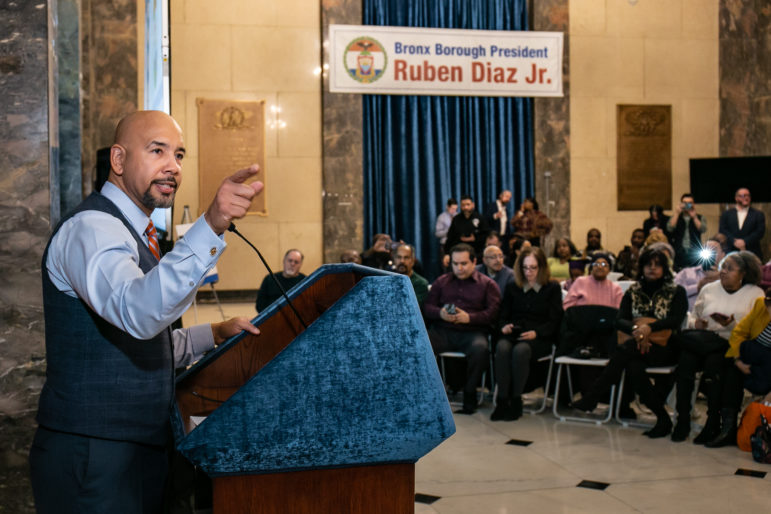
Adi Talwar
Bronx Borough President Ruben Diaz Jr. delivering his State of the Borough in February 2020.In a borough with the highest COVID-19 death rate in the city, with an unemployment rate a third higher than any other county in the state, where shootings are up 20 percent this year, one might ask: Does anyone care who the Bronx borough president is? Does an office of limited power—with no control over agencies, no decisive land-use power and a small budget—really matter?
The people running for the post argue, not surprisingly, that the answer to both queries is yes. If nothing else, the “BP” is a cheerleader, champion, ambassador, and spokesperson for the Bronx.
So, who should speak for the Bronx? Should it be Councilmember Fernando Cabrera, Councilmember Vanessa Gibson, or Assemblywoman Nathalia Fernandez, who are considered the front runners? Or State Sen. Luis Sepulveda, who is facing a court date later this month over allegations he beat and choked his wife? Or ex-cop Sammy Ravelo or long-shot candidate Victor Gutierrez, who are also in the mix?
Maybe the Bronx has no need for an elected spokesperson at all. It survived the ravages of planned shrinkage in the 70s, and crack wars of the 80s, thanks to the courage and smarts of community activists. Yet the disparate interests of wealthy Riverdale, middle-class Morris Park, low-income Hunts Point and points between argue for a person in government to advocate for the borough that, let’s face it, is different from the others: With its high poverty rate and 25 percent parkland, rich culture and association with urban blight, the Bronx has unique needs and its own story.
A rare open seat
Borough presidents have been part of that tale. Over the past 34 years, there have only been three “beeps” in the Bronx.
From 1987 through 2001, Fernando Ferrer helped shape the rebuilding of the borough, especially under Mayor Koch’s Ten-Year Plan for housing. Adolfo Carrion, BP from 2002 into 2009, steered controversial development projects like the new Yankee Stadium and Bronx Terminal Market. And over the past 12 years, Ruben Diaz, Jr., has been a relentless cheerleader for investment: According to his most recent development report, $23 billion in investment and 55,295 residential units (about half of them government subsidized) have taken root in the Bronx during Diaz’s tenure.
Diaz came to power in a special election in 2009 after Carrion left early for a post in the Obama administration. Ferrer was appointed to the office in ’87 upon the resignation of Stanley Simon, who himself was appointed to the job when Robert Abrams became attorney general in 1978.
That means this June’s Democratic primary—and since the Bronx has a 13:1 Democratic registration advantage, that’s tantamount to election—is only the third time since 1969 that Bronx voters get an open competition for borough leader, and only the second time on a regular election timetable.
Sizing up soft power
Borough presidents used to wield more power in New York City, sitting on the Board of Estimate that controlled the budget and land use, but a Supreme Court case and charter revision changed that in 1989. Now borough presidents have an advisory voice on land-use applications, appoint community board members, monitor the delivery of city services and control a small portion of the city’s capital budget. They can propose legislation to the City Council. The Bronx beep’s annual budget of $6.5 million is more than the public advocate’s or Independent Budget Office’s bankroll, but only about 4 percent of the budget for the mayor’s office.
Despite the limitations of the post, there are substantive ideas in the 2021 race. Most revolve around the idea that the borough president wields substantial soft power as a spokesperson for a borough of 1.4 million people—more than live in Dallas or San Francisco.
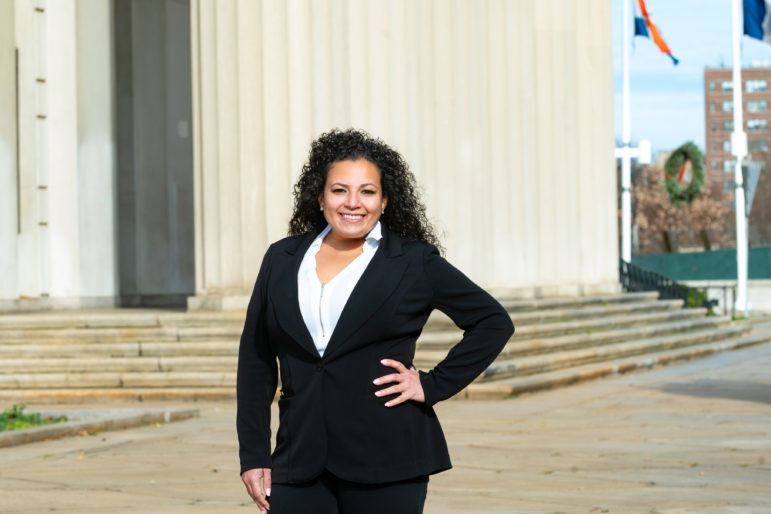
“I see the office as certainly a powerful place of influence,” Fernandez says. “While we don’t have that voting power, we still have a loud platform, a strong voice.” She sees the BP as “a mini public advocate office – bringing light to issues, presenting solutions, and working with partners in government to get solutions enacted.”
A former aide to Mark Gjonaj in Assembly, Fernandez won a special election in 2018 to fill Gjonaj’s seat when he moved to the City Council. She’s been re-elected twice. She’s passed two standalone bills, but other proposals she authored have worked their way into omnibus legislation, including a measure aimed at avoiding deaths of people in custody. Sen. Elizabeth Warren endorsed her 2018 reelection, and Assemblymembers Michael Blake, Kenny Burgos and Chantel Jackson are backing her BP bid. Asked about her relative newness on the scene, she says, “I’ve been working in the state Assembly and state government my entire career. I’ve certainly had great experience in government and I’m ready to build on my experience. I don’t think it’s too early.”
Fernandez says simply winning the office would reflect “progress for Bronx leadership” since she would be the first woman and first Latina to be elected borough president. Beyond that, “one of the things we have to really address is the job loss we’ve experienced. We need to do everything we can to make sure small businesses rebuild,” including potentially using the BP office to connect small businesses to bank loans.
She also feels remote learning is, to some degree, going to be part of student life for the next couple years. “So I want to look towards getting free Wi-Fi for the borough through public-private partnerships,” she says. “We see it a necessity, not a luxury.”
Fernandez also says she would put pressure on the feds to fully fund repairs to public housing.
The pastor’s record
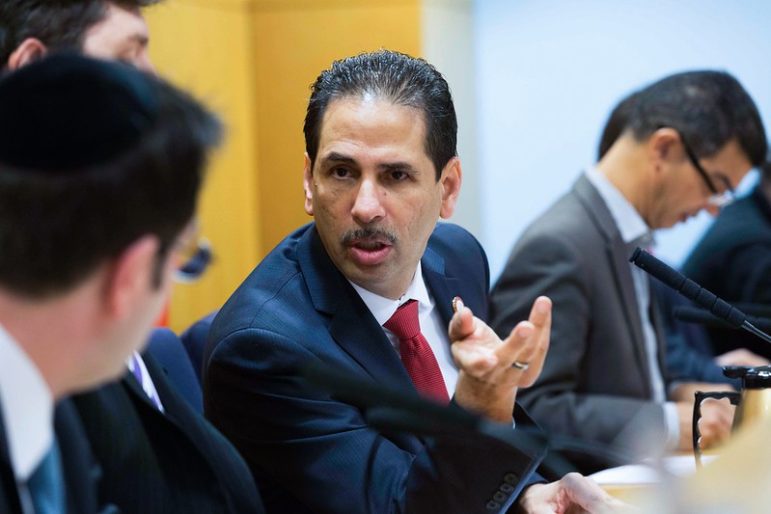
Emil Cohen/NYC Council
Cabrera
Cabrera, a pastor, is in his third term on the Council, where he has passed 30 pieces of legislation, including measures on video conferencing for youth in secure detention facilities, reporting on environmental data in schools and measures affecting the for-hire vehicle industry. He’s gotten more notoriety for other moves, however, like threatening to scuttle the Kingsbridge Armory plan if developers didn’t commit $100,000 to a defunct nonprofit Cabrera once ran, his opposition to abortion and gay marriage, and comments in 2014 that appeared to endorse anti-gay policies in Uganda.
Cabrera now says he accepts Roe v Wade and gay marriage as the law of the land, and points to his voting record in the Council on LGBT issues: He voted yes on bills banning conversion therapy, calling for a study on the health needs of LGBT youth, and adding gender pronoun questions to official city forms. In 2014, he did vote against measures permitting gender marker changes on birth certificates.
In recent months, Cabrera has criticized the restrictions the state imposed on restaurants during the pandemic, and has advocated for 50 percent indoor dining occupancy instead of 25. He has also faulted the city for not putting more money into helping small businesses, especially those in the Bronx.
If elected, Cabrera says he’ll push for science labs in every school, more vocational and technical schools, an all-girls school in the Bronx and a “harbor high school” attached to SUNY Maritime College. He wants to site wellness centers in schools and to create year-round farmers’ markets. A supporter of community land trusts in the past, he pledges to continue to foster them.
Cabrera says things like a salsa museum could revive tourism to the Bronx. Noting that the borough president’s $17 million annual capital budget “is not a small amount of money,” he promises to put capital funds behind more fully accessible senior housing, as well as more bus shelters and bus timers.
One of the earliest champions of the Cure Violence approach to shootings, Cabrera says that approach will be key to reducing violent crime in the Bronx. But it won’t be enough to defeat gang violence. “We’re going to have to be very creative and very intentional in helping people in the Bronx create businesses and create jobs and that will have an effect on crime,” he says. “Whenever you provide jobs and an educational pathway for those young people to bounce back, they don’t go back to the life.”
He is not a supporter of defunding the police. “This city is under constant threat from the outside. We want to make sure we have protection. I’ve seen what happens when we don’t have that level of protection we need,” he says, in reference to the September 11 attacks. “The people of the community are saying ‘no’ to defunding.”
A focus on health
An Assemblymember for four years before being elected to the Council in 2013, Gibson has been the primary sponsor on 18 bills that became law. One established a school siting task force, while others required the city to formulate a 10-year food policy plan and cracked down on tenant harassment. She’s taken flak for endorsing breakaway Democrat Jeff Klein in 2014 and for the $5,000 fine she paid the Conflict of Interest Board for trying to get out of a traffic ticket in 2014. But she recently nabbed the endorsement of the stalwartly LGBTQ-friendly Jim Owles Liberal Democratic Club, despite her voting against gay marriage in Albany because, a club leader said, she had evolved on the issue.
Gibson says her blend of state and city government experience equips her well to run borough hall. She’s focusing on health issues.
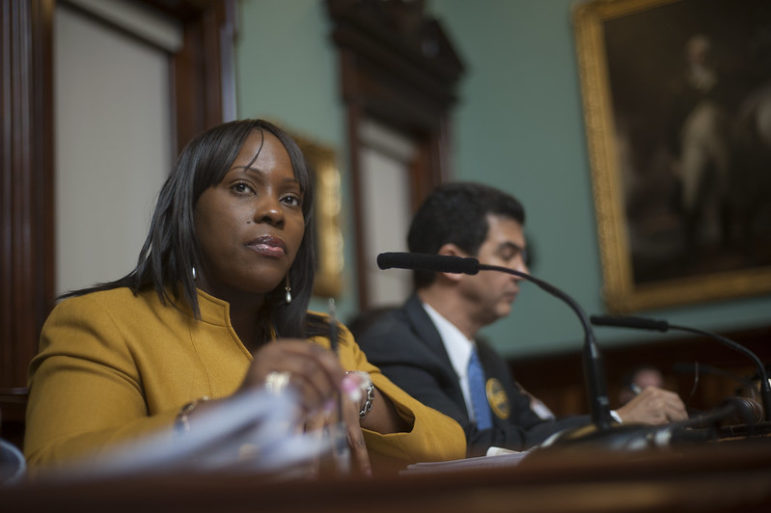
William Alatriste/NYC Council
Gibson
“I am always reminded that the Bronx has the highest death rate because of COVID-19. The vaccination is here. We have to make sure there is an equitable distribution,” she says. But there are longer term issues, she adds.
“We have to deal with access to affordable and low-cost healthcare,” especially for the underemployed, and she says she’ll work to create partnerships that connect families with insurance and primary care. Gibson also connects health to food access, with an expanded healthbucks program, year-round farmers markets and more intensive use of the FRESH program to encourage supermarket development.
“I really want to achieve universal heathy food. No matter what ZIP code you’re in, your neighborhood, how much is in your bank account, you should have healthy food for your family,” she says. That means the development of more urban farming and leveraging the food distribution infrastructure in Hunts Point. “I want to find a way where produce at the Terminal Market does stay in the borough. There’s a lot of creative things we should do with our own treasures here in the Bronx.”
The connection of health to housing is also important, she says: Many in the Bronx “live with mold and lead paint and asbestos and that leads to heath problems, too.” She backs community land trusts and expanded home ownership, and wants to adjust the term sheets that govern existing housing subsidy programs, as well as push the feds and Albany to calibrate the value of housing vouchers to the Bronx market.
The ULURP process “really has to be revamped,” Gibson says. “There’s not much civic engagement, and the community board really only has an advisory voice. We need to find them new tools.”
A former chair of the Council’s public safety committee, Gibson supports the “crisis management system” approach to reducing violence. “It’s too easy to get a gun. But the fact that so many of our young people are able to use a gun is equally as troubling,” she says.
On the calls for a smaller NYPD budget, she says: “I get it and I really understand but I was not a fan of the ‘defund’ phrase because decimating the NYPD budget is going to hurt communities of color that need a cop present,” although she adds, “we can’t keep relying on the cops to save us from ourselves.”
Gibson and Cabrera both played a leading role in one of the biggest public policy decisions in the Bronx of recent years: The 2018 Jerome Avenue Rezoning, which affected parts of both their districts. The pair negotiated with the city to improve the deal, then voted for it, against some opposition in the community.
A more conservative voice
Ravelo, a Dominican immigrant, served in the Gulf War and then joined the NYPD, where he did undercover work for more than 25 years, served on the fugitive enforcement unit and reached the rank of lieutenant. He ran in the 16th Congressional district Democratic primary last year, placing fourth in the race where Jamaal Bowman unseated Rep. Eliot Engel.
“When you take the ‘diaphragm bill,’ the city budget taking funding from the police department, the Bronx being last in every major issue—education, housing, public safety, healthcare outcomes,” Ravelo says, he feels that there’s ample reason to reject people who’ve been in power. “The career politicians that are running right now are part of the reason that we are always last.”
Ravelo says education is his top issue, but he has strong opinions on public safety: He attributes 70 percent of the violent crime spike over the past year to what he deems misguided police reforms. “When you dial up the temperature and the anti-police rhetoric in any neighborhood, the criminal element knows this. And what happens now is they go out knowing the police are going to be restrained a certain extent.” He also believes that police-community relations were on the mend in New York City before George Floyd was killed in Minnesota.
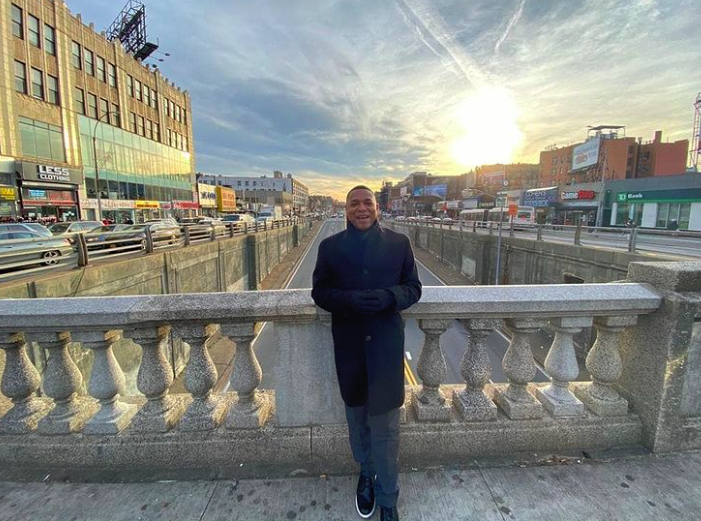
SammyforBx
Ravelo
Ravelo is also concerned that the Bronx “is going to become the homeless hub of New York City.” He says, “That’s where they’re going to dump all the homeless people.” His education plan calls for more trade schools, tuition-free community college and the cancellation of student debt—though the latter two ideas would be tough for a borough president to pursue. Asked if he might run in the general election as a Republican, Ravelo was not definitive; “Right now I am concentrating on the Democratic primary. I am not looking ahead to the general election and staying in the race. That’s the answer I am giving.”
Sepulveda’s campaign did not respond to a request for an interview. He faces a Feb. 24 court hearing on charges on misdemeanor assault, criminal obstruction of breathing and second degree harassment stemming from a Jan. 9 incident involving his wife. Sepulveda joined the State Senate in 2018 after five years in the Assembly and has championed progressive causes, including Sen. Bernie Sanders’ 2016 and 2020 presidential campaigns.
The sixth candidate in the race, Gutierrez, has raised little money. His Twitter profile promises that he will be “The First Bronx Borough President to Create The Most Jobs in The Bronx And Make It The Best Place to Live in The World.”
The X factors
The borough presidency is sometimes described as a stepping stone. The record is mixed. David Dinkins was Manhattan’s BP before becoming mayor; his two successor beeps, Ruth Messinger and C. Virginia Fields, ran for mayor but fell short. A current president, Brooklyn’s Eric Adams, and a former Manhattan beep, Scott Stringer, are leading candidates in this year’s mayoral election.
Ferrer ran for mayor three times, and was the Democratic nominee in 2005, gamely challenging the majesty of the very deep-pocketed Mayor Bloomberg but losing decisively. He’s now the vice-chairman of the MTA. Carrion served as the first director of the White House Office of Urban Affairs, a cabinet-level post, then ran for mayor in 2013 as a Republican and then as an Independent; he finished third with less than 1 percent of the vote. Diaz abandoned his 2021 campaign months ago, and it’s not clear what the future holds for him.
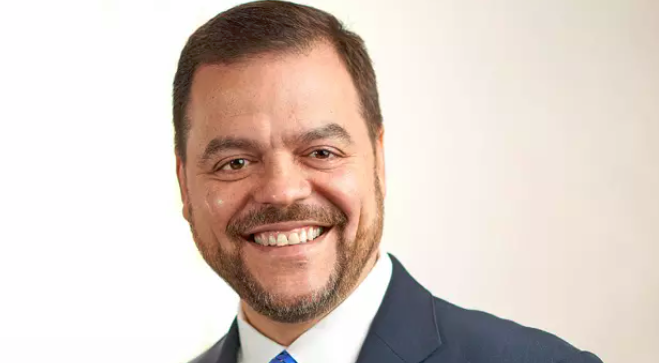
What the future holds for those running to replace Diaz probably doesn’t only hinge on their vision for the office. With the Bronx Democratic organization promising to remain neutral in the contest, endorsements from big-name pols and unions will matter a lot. So will money, and on that count, Cabrera has a large advantage: he’s outraised all his rivals and underspent a couple of them, and has $120,000 in the bank, more than twice as much as anyone else. If the Campaign Finance Board honors all the matching-fund claims filed by the field, everyone should have enough to wage a legitimate campaign, but Cabrera will still have the most firepower. A quarter of his money has come from outside the city (about 20 percent of Gibson’s has) and Cabrera has accepted cash from both city and statewide landlord lobbying groups and from landlord Ved Parkash, a notorious evictor.
It’s impossible to ignore the role identity might play in the race. The Bronx is 30 percent Black and 56 percent Latino. Gibson, who is Black, is the only non-Latino in the race. Dominicans are the largest Latino group. Ravelo is Dominican. Sepulveda is Puerto Rican. Cabrera has mixed Dominican-Puerto Rican heritage and Fernandez is Cuban and Colombian.
Ravelo suspects his Dominican heritage will be a boon to his candidacy: “I’m not going to be ‘the Dominican candidate’ but there will be a lot of support in that sense.” He also believes ranked-choice voting could lead to surprising outcomes in the race. The first point is debatable. The second is almost certainly true.








